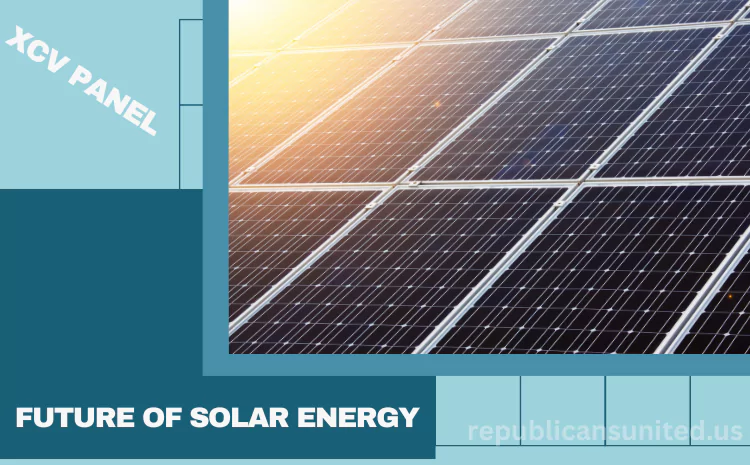
Introduction to XCV Panel
Welcome to the exciting world of solar energy, where innovation and sustainability intersect to shape a brighter future. Today, we delve into the realm of XCV Panel, a revolutionary technology that is leading the way in transforming how we harness the power of the sun. Join us on this deep dive as we explore the endless possibilities and potential that solar energy holds for our planet and beyond.
What is Solar Energy?
Have you ever stopped to wonder how the sun’s rays can power our homes and businesses? Solar energy is a renewable source of energy that harnesses sunlight to generate electricity through photovoltaic panels. These panels are made up of solar cells that convert sunlight into direct current (DC) electricity.
The beauty of solar energy lies in its sustainability and abundance – the sun provides an infinite supply of clean energy each day. By utilizing this natural resource, we can reduce our dependence on fossil fuels and decrease harmful greenhouse gas emissions.
Solar technology continues to evolve, making it more efficient and affordable for consumers. From rooftop solar panels to large-scale solar farms, advancements in photovoltaic systems have expanded the reach and accessibility of solar energy around the globe.
Embracing solar power not only benefits individual consumers by lowering electricity bills but also contributes to a cleaner environment for future generations. So next time you see those shimmering panels soaking up the sun’s rays, remember they’re helping pave the way towards a greener tomorrow.
Advancements in Solar Technology
In recent years, advancements in solar technology have revolutionized the way we harness renewable energy. One significant development is the improvement of solar panel efficiency through innovations like PERC (Passivated Emitter and Rear Cell) technology, which enhances light absorption and electricity generation.
Moreover, the integration of smart technologies into solar systems allows for better monitoring and optimization of energy production. This includes features like real-time data tracking and remote system control, making solar energy more accessible and efficient for consumers.
Another exciting advancement is the rise of thin-film solar panels that are lighter, flexible, and easier to install than traditional silicon-based panels. These innovative designs open up new possibilities for incorporating solar power into various applications beyond rooftop installations.
These technological breakthroughs continue to drive down costs and increase the viability of solar energy as a sustainable alternative to fossil fuels. The future looks bright as research and development efforts pave the way for even more cutting-edge solutions in the field of solar technology.
The Cost and Benefits of Solar Energy
Solar energy offers a range of benefits that go beyond just cost savings. The initial investment in solar panels can be offset by significant long-term savings on electricity bills. This means homeowners and businesses can enjoy reduced energy costs over time.
Additionally, solar energy is a renewable resource, meaning it doesn’t deplete the Earth’s finite resources like fossil fuels do. By harnessing the power of the sun, we can reduce our dependence on non-renewable sources of energy and decrease our carbon footprint.
There are also financial incentives for investing in solar energy, such as tax credits and rebates offered by governments to promote clean energy usage. These incentives help make solar installations more affordable for individuals and businesses looking to make the switch to renewable energy.
The cost-benefit analysis of solar energy tilts heavily towards the positive side, making it not only an environmentally friendly choice but also a financially savvy one in the long run.
Impact of Solar Energy on the Environment
Solar energy has a significant positive impact on the environment. By harnessing the power of sunlight to generate electricity, solar panels reduce our reliance on fossil fuels, decreasing harmful emissions that contribute to air pollution and global warming.
The installation of solar panels helps combat climate change by reducing greenhouse gas emissions. This clean energy source also conserves water resources typically used in traditional electricity production methods like coal or natural gas.
Furthermore, solar energy production does not produce noise pollution or disrupt wildlife habitats compared to other forms of energy generation. The use of renewable solar power contributes to a cleaner and healthier planet for future generations.
The environmental benefits of solar energy make it a crucial player in transitioning towards a more sustainable and eco-friendly future.
Future Predictions and Opportunities for Growth
As we look ahead to the future of solar energy, the possibilities seem endless. With ongoing advancements in technology and increasing investment in renewable energy sources, the potential for growth in the solar industry is immense.
One key area of focus is enhancing storage capabilities to address intermittency issues and ensure a more reliable energy supply. This could lead to increased adoption of solar power on a larger scale, especially as battery costs continue to decline.
Furthermore, innovations in materials science are driving efficiency improvements in solar panels, making them more affordable and accessible to a wider range of consumers. This accessibility will likely spur further market expansion and create new opportunities for businesses in the clean energy sector.
As governments around the world prioritize sustainability goals and carbon reduction targets, there will be an even greater push towards renewable energy solutions like solar power. This shift presents numerous avenues for growth and innovation within the industry, positioning solar energy as a cornerstone of our sustainable future.
Conclusion: The Bright Future of Solar Energy
The future of solar energy looks bright with the continuous advancements in technology, making it more efficient and affordable. XCV Panel is at the forefront of this evolution, offering cutting-edge solutions for harnessing the power of the sun.
As we move towards a more sustainable future, solar energy will play a crucial role in reducing our dependence on fossil fuels and mitigating climate change. With increasing awareness about environmental issues, there is a growing demand for clean energy sources like solar power.
By investing in solar energy now, we are not only contributing to a cleaner planet but also creating new opportunities for growth and innovation. The potential for expansion in the solar industry is vast, opening up possibilities for job creation and economic development.
As we embrace the limitless potential of solar energy and technologies like XCV Panel, we are paving the way towards a greener tomorrow. Together, we can harness the power of the sun to create a sustainable future for generations to come. Let’s step into this bright future hand in hand with solar energy leading the way.







